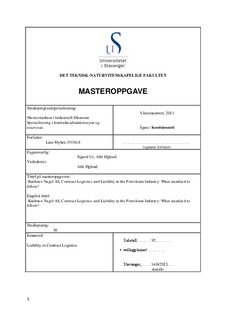| dc.description.abstract | The companies working in the petroleum industry often take advantage of the services of contract logistics provided by forwarding agents. Contract logistics is when a firm provides multiple logistic services to a company by using outsourced logistic services for some or all of their supply chain management functions. Kuehne+Nagel As are such a firm and also provide ship’s agent- services. They’re role is to arrange transportation and storage, as a mediator by arranging the contracts between the companies and a third person, or by arranging the actual transportation as a “subcontractor carrier.” For a firm like Kuehne+Nagel it is necessary to minimize their liability in the contracts, especially in such a dynamic industry where they deal with very large costs and high risks. This industry requires tailor-made solutions and -contracts, however the companies use standard construction contracts which are not fit for the services provided by Kuehne+Nagel. Their Nordic transportation contracts are based on the Nordic standard, NSAB 2000, which is tailor-made for the services of a forwarding agent. However, their international contracts are not regulated by the same liability-limitations in this standard and deviate from the “ideal”. Kuehne+Nagel were interested in knowing what the deviations were and if there is a trend in these deviations. In this thesis a comparative analysis was performed regarding liability, by analyzing three international contracts with different scope of work handed to Kuehne+Nagel from three different companies, A-C. These contracts were compared to the NSAB 2000 and theory based on Norwegian rules and regulations.
The results from the analysis revealed that the international contracts deviated more from the NSAB 2000 than from theory on general petroleum contracts. This is because the contracts were based on standard contracts not fit for the services provided by forwarding agents, also revealing that there is a lack of relevant theory for the services of a forwarding agent. Today’s theory is more contractor-based and there is a need for new theory more focused on the transportation.
These contracts were all, in some degree, based in the “knock for knock”-principle. This principle is not included in the NSAB 2000 because it does benefit the forwarding agent arranging either transportation or arranging a contract between two Parties. By having the role of a “middleman”, the forwarding agent should not hold the risk of conditions he can not affect, nor be liable and indemnify for losses inflicted on his Contract contributors or “Subcontractors”. Contract A and B was very similar regarding the “knock for knock”-principle, however Contract B had the necessary limitation that held Kuehne+Nagel liable for the Cargo while it was in his custody for the role as a subcontractor carrier. Contract C used the “knock for knock”-principle for Company C’s benefit, where he was the only one with the right to be held Harmless. None of the international contracts matched the NSAB 2000 regarding the liability for third persons or “Subcontractors”. Theory and the contracts did not distinguish between the forwarding agent and these. All the contracts held Kuehne+Nagel liable for their “Subcontractors”, which only match the NSAB if the forwarding agent acts as a subcontractor carrier, but contradicts with the NSAB regarding their role as a mediator. Regardless of the role of the forwarding agent, the NSAB never require the forwarding agent to indemnify any loss, damage or delay inflicted by any third person. He shall only file a complaint and assist the Company in his claims against this third person. This contradicts with the requirements in all the contracts.
There was some trend in the deviations from the NSAB, despite the fact that the contracts being analyzed involved different types of services. The use of the “knock for knock liability limitations” was such a trend, because it was included in some degree in all the contracts. The reason for this is that this principle is included in the general standard petroleum contracts often used as the basis in the logistic contracts. Another trend was the subject of “subcontracts” and the liability. This also matched theory, but not the NSAB 2000 which only require that the forwarding agent pays indemnity for any loss, damage or delay due to their own neglect, not for their “subcontractor’s” neglect. The lack of distinction between the Contractor and the Subcontractors in the contracts was present in all the contracts. These contracts did not take into account the role of the forwarding agent being a “middleman”, holding more liability than he should.
It was clear that contract C involving the ship’s agent-service held Kuehne+Nagel liable for too much. This is probably because there are no regulations or conventions for this type of service. There is obviously a need for this. It was also clear that there is a need for tailor-made logistic contracts.
The NSAB 2000 is a good standard for regulating the liability of the forwarding agent and should also be used in the international contracts. However, it should include more specific rules on the Liability for “third persons” and Third Parties, the rules for payment, and insurance-requirements. | en_US |
